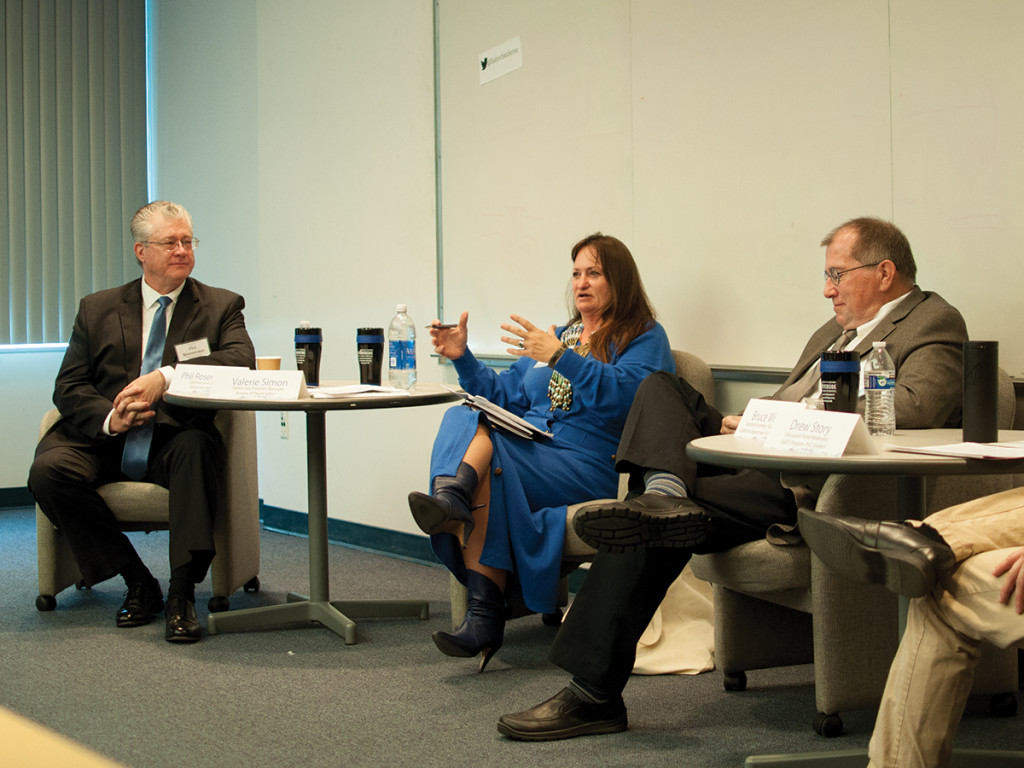
Panelists Phil Rosenwater, Valerie Simon and Bruce Wilcox discussed the current and future state of the Salton Sea on Thursday, Feb. 4. Held in Bourns College of Engineering (BCOE) A265, the talk gave insight into decisions being made at the local, state and federal level regarding water policies and other projects that will have an impact on the Salton Sea.
The Salton Sea is the biggest man made lake in California; however, it is drying up at an alarming rate and becoming a hazard to the numerous endangered species and population that reside in the area. Water is unable to flow out of the sea, making evaporation its only outlet. This has led to a detrimental increase in salinity. The ecological and human health concerns have prompted many government officials to evaluate ways to combat the growing issue.
Rosenwater is the deputy director for the Economic Development Agency of Riverside and the executive director of the Salton Sea Authority. In addition to safeguarding wildlife habitats and protecting human health, Rosenwater touched on the other important goals of Salton Sea restoration on the local level. “We want to make sure that we restore other values of the sea. Those values being recreational components and property values,” he explained.
Simon, the Salton Sea program manager for the Bureau of Reclamation’s Lower Colorado Region, spoke on federal priorities which included partnering with local organizations. “We’re very good at program and project management so we know how to cut to the chase and get things done and spend money wisely and within budget. So we’re good at helping the state and the local agencies with that kind of thing,” she said. “I get $300,000 every year to support our interest in the Salton Sea … I take whatever I can and I tack it on to other projects that are going on.”
As the assistant secretary for the Salton Sea Policy for the California Department of Natural Resources, Wilcox relayed state goals. He explained that they have more than a moral obligation to improve the state of the sea, such as the bill AB1095 that passed in 2015 which requires the secretary of the natural resources agency, in coordination with the Salton Sea Authority, to lead restoration efforts. “The state also passed legislation for restoration of the Salton Sea. So we clearly have contractual obligation,” he explained.
The state would like to fix the air quality, human health and habitat issues as well as consider innovative techniques for renewable energy — which could serve as a funding source. “The other bigger goal quite frankly though I think is to get folks like the audience here today interested in what’s going on at the Salton Sea,” Wilcox expressed. He also has hopes of creating a science committee dedicated to research. “We’re trying to get groups like this group involved in different research at the Salton Sea,” he said.
Wilcox stated that they need to work with the legislature to receive the money needed to fund and support various programs that they would like to implement while Simon mentioned a possible collaboration with Mexico. “As things move along on we’ll be having some serious conversations with Mexico on various opportunities that might be arising,” Simon said.
With plans moving forward, Wilcox is confident that despite the various effects of climate change, agriculture will remain stable. “From the perspective of the I.E. and the Coachella Valley, we assume that farming will continue, it’s probably one of the most valuable resources in that area,” he explained.
Although they each have high hopes for improving the Salton Sea, Rosenwater stated that things need to be put into perspective, which can be difficult to do when dealing with the public. “You can’t return it to what it was in the 1950s. It’s going to have to be smaller. It’s going to have to be managed,” he said. Other obstacles include creating a unified message that recognizes the several elements that a concrete plan is comprised of, and attempting to avoid making promises that they may be unable to keep.
Each panelist believes the Salton Sea can be an area that brings great prosperity, despite complications that may arise. “I foresee an opportunity for a vibrant area that’s kind of like a world-class leader in renewable energy, opportunities, not just that but for dust control measures that other countries will emulate and we’ll be the school house for those kinds of technologies,” Simon explained.








